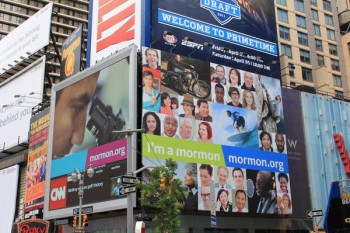During the years of the U.S. presidential campaign and especially during 2012 Mormons and Mormonism were constantly in the news, for better or for worse. Certainly, Mitt Romney was (and is) a stellar example of what Mormonism (The Church of Jesus Christ of Latter-day Saints) can produce — he is a devoted and faithful husband and father, who gives generously to charity, and who has spent countless hours (in spite of a demanding and successful career) in direct service to his church. In his church service he has been the equivalent of a pastor or priest, but all this was done without remuneration. Romney came in only a few hundred thousand votes behind Barak Obama and fared especially well with white Christian voters. These seemed to read some articles about Mormons and Mormonism, and their opinions tended to take a turn toward viewing Mormonism with a favorable eye. “Roughly 4-in-10 (42 percent) now see the Mormon religion and their own beliefs as having a lot in common, up 14 points from 28 percent in November 2011.” But the rest of the American population seems not to have paid much attention. A new, post-election study performed by the Pew Forum, albeit very small (only about 1,500 respondents), shows most people know no more about Mormonism now than they did before the campaign. (Read more here….)
“More Americans mention positive terms such as ‘good people,’ ‘dedicated’ and ‘honest’ than did so one year ago (24 percent today vs. 18 percent in 2011),” the report indicated. “Impressions of Mormonism using positive descriptors is up among several religious groups, including white evangelical Protestants, white mainline Protestants and white Catholics — all groups that favored Romney in the election.”
 The study showed that about the same amount of people as in 2011 think Mormonism is not a Christian religion. “Romney was the subject of about twice as much religion-related media coverage as Barack Obama in the 2012 presidential campaign, according to a separate analysis by the Pew Research Center’s Project for Excellence in Journalism and the Pew Forum.” [1]
The study showed that about the same amount of people as in 2011 think Mormonism is not a Christian religion. “Romney was the subject of about twice as much religion-related media coverage as Barack Obama in the 2012 presidential campaign, according to a separate analysis by the Pew Research Center’s Project for Excellence in Journalism and the Pew Forum.” [1]
During the course of the campaign, the portion of U.S. adults who are aware that Romney is a Mormon rose steadily from 39% in November 2011 to 65% after the election. Less than 30% of those interviewed, however, were able to answer just two basic questions about the Church of Jesus Christ, even after all the publicity the Church received. The answers to the two questions were that the Church of Jesus Christ was organized after 1800, and that Mormons believe Christ visited the Americas.
Media coverage of Romney’s faith during the presidential campaign appears to have had little impact on public knowledge about the Mormon religion. Roughly eight-in-ten adults (82%) say they learned either “not very much” (32%) or “nothing at all” (50%) about the Mormon religion during the campaign; just 16% say they learned either “a great deal” (3%) or “some” (13%). [1]
Half of the people interviewed said they know very little to nothing about the Mormon faith, even after the “Mormon Moment” flooded the press with information about the LDS Church.
Knowledge about the Mormon religion is higher among the religiously unaffiliated than among either Protestants or Catholics. More than a third of the unaffiliated (36%) correctly answer both factual questions, as do 28% of Protestants and 22% of Catholics. There is no change in factual knowledge among religious groups, including the unaffiliated, since 2010. There is also no difference in factual knowledge about Mormonism by political party. [1]
The increase in favorable attitudes toward the LDS Church is found mostly among Catholics and Protestants, even Evangelical Protestants, but it is slight — only 6 percentage points, from 18% to 24%. Even so, Mormon.org has seen 650,000 requests for Mormon missionaries or scriptures during the Mormon Moment, so some people are paying attention.



